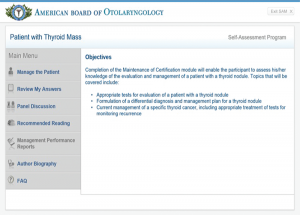The ABOto is pleased to announce that U.S. otolaryngology residents PGY levels two through five now have access to the Part II and Part IV MOC modules. The ABOto is providing this access for the residents at no charge to either the resident or the program.
Explore This Issue
November 2014The MOC Part II modules are used for self-assessment. Each self-assessment model (SAM) begins with a patient management section in which the resident will collect data and interpret the information, followed by a diagnosis/differential diagnosis process. Finally, the resident will “manage” the patient. The module includes a variety of visuals, including patient photographs, imaging studies, histopathology, and video.
Successful completion of the module requires a score of 80% in each of the three sections. If the resident does not obtain a “passing” score, he or she can go through the patient management section repeatedly. The ABOto does not require residents to complete the modules but simply offers them as an educational tool.
In addition to the patient management section, there is a 30-minute panel discussion of the controversial aspects of the topic, as well as a recommended reading list.
Residents also have access to the Part IV Performance Improvement Modules (PIMs). These modules are based on the classic quality improvement cycle of measure, analyze, implement changes, and re-measure. The first PIM is based on the American Head and Neck Society’s oral cavity cancer measures. Essentially a data registry that provides feedback, the participant enters data for 10 patients with a given condition and then receives feedback by comparing the entered data to others who have completed the module. After reviewing strengths and areas for improvement, the participant enters five more patients to demonstrate improvement. PIMs in allergy and rhinology are coming very soon, and more PIMs will be produced in 2015.
Finally, the ABOto is putting the finishing touches on a module format called SEMO, which stands for Structured Educational Module. SEMOs will be linked to the topics covered in the SAMs and PIMs, and access is limited to MOC participants and now residents. The SEMO is written in a highly structured bulleted format and will be rich in illustrations and video. In addition, there will be links to article abstracts from the reading list. The ABOto is field testing a SEMO on oval cavity cancer, and, once the format is finalized, SEMOs will ultimately be produced for each SAM and PIM.
